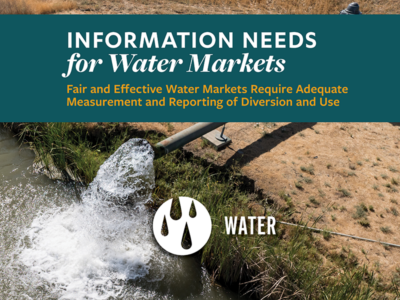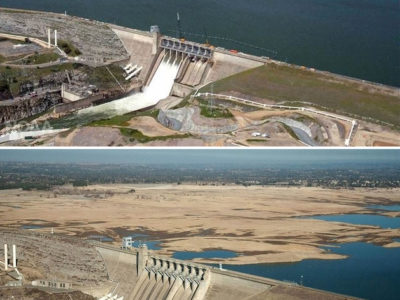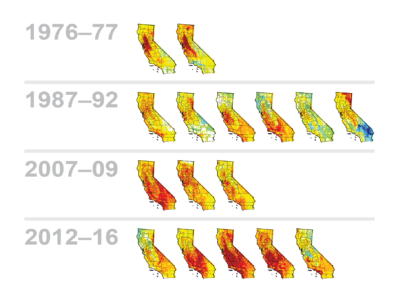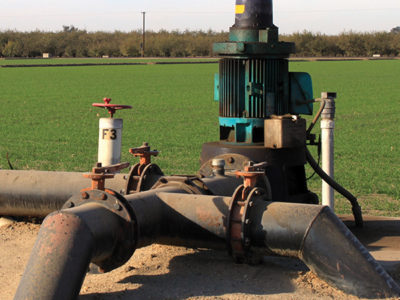water management
Meeting information needs for water markets: Understanding water diversion and use
New CLEE report examines a prerequisite for fair and effective water markets
by Nell Green Nylen and Molly Bruce Water scarcity is a growing problem for agriculture and ecosystems across the U.S. Southwest. In many areas, unsustainable water use has overstretched local water supplies, and climate change is making these supplies more volatile. Water markets have the potential to enhance climate resilience by helping water users adapt …
CONTINUE READINGMaking Key Policy Decisions in Advance of Droughts
Part 6 in a Series on Improving California Water Rights Administration and Oversight for Future Droughts
It’s hard to respond effectively to a crisis when you don’t have clearly defined priorities. This is true for sudden-onset crises, like floods and wildfires, and also for slow-onset crises, like droughts. My recent posts have explored why the State Water Resources Control Board (Board) should develop a contingency-based framework to support its drought decisions …
Continue reading “Making Key Policy Decisions in Advance of Droughts”
CONTINUE READINGDeveloping a Decision-Support Framework for Curtailment
Part 5 in a Series on Improving California Water Rights Administration and Oversight for Future Droughts
During a drought, California’s limited water supplies should be allocated transparently, efficiently, and predictably in accordance with the priorities that flow from state and federal law. But what does this mean in practice? What happens when there is not enough surface water to go around in a watershed? California water rights law says that certain …
Continue reading “Developing a Decision-Support Framework for Curtailment”
CONTINUE READINGA Contingency-Based Framework to Support Drought Decision Making
Part 4 in a Series on Improving California Water Rights Administration and Oversight for Future Droughts
In my last post, I outlined actions the State Water Resources Control Board (Board) can take to improve its future drought response capabilities. Our core recommendation is for the Board to bring greater predictability, timeliness, and effectiveness to water rights administration and oversight during droughts by proactively developing a contingency-based framework to support its drought …
Continue reading “A Contingency-Based Framework to Support Drought Decision Making”
CONTINUE READINGActions to Improve California Water Rights Administration and Oversight for Future Droughts
Part 3 in a Series on Improving California Water Rights Administration and Oversight for Future Droughts
In California, the next drought is always looming on the horizon. While we don’t get advance warning of when a drought will occur, how long it will last, or how severe it will be, we do have advance knowledge that drought planning and preparation are important. First, we know water management during droughts can have …
CONTINUE READINGWater Rights Administration and Oversight During Past California Droughts
Part 2 in a Series on Improving California Water Rights Administration and Oversight for Future Droughts
In the first post in this series, I talked about why it’s important for the state of California to spend time preparing for future droughts even in wet years like this one. This post examines some of the lessons from past droughts that can inform these preparations. Past droughts have stress-tested California’s water management institutions, …
Continue reading “Water Rights Administration and Oversight During Past California Droughts”
CONTINUE READINGWhy It’s Important to Prepare for Drought During a Deluge
Part 1 in a Series on Improving California Water Rights Administration and Oversight for Future Droughts
In the midst of the wet winter storms bringing rain and snow to California this year, you might not expect drought preparations to be among the state’s current priorities. And yet, they need to be. In this post, I’ll explore why to set the stage for a blog series that explores what the state can …
Continue reading “Why It’s Important to Prepare for Drought During a Deluge”
CONTINUE READINGWhen are markets appropriate tools for sustainably managing groundwater?
New report from Berkeley Law’s CLEE outlines critical considerations for local groundwater markets under SGMA
Locals implementing California’s Sustainable Groundwater Management Act (SGMA) are rapidly turning from questions about who will manage groundwater and how they should approach institutional design to next-level questions: What does sustainability mean for a particular basin, and how will local managers achieve it? One of many potential management tools is a local groundwater market. SGMA opens the door …
Continue reading “When are markets appropriate tools for sustainably managing groundwater?”
CONTINUE READING











